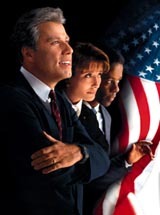
Primary Colors
Written by Kiersten Conner-Sax | Posted by: Anonymous
While the movie could have been much, much better than the book, it’s not. People write—or at least read—fiction because it’s more compelling than reality. Klein’s book, and Elaine May’s screenplay, seem to be written from the point of view that people write fiction so they can bash on famous people without fearing for libel suits and/or tack on an ending stolen from a better author. Unlike its fellow well-timed-thinly-veiled-Clinton-commentary Wag the Dog, Primary Colors has neither a satiric edge nor really much of anything to say. Except that this very Bill Clinton-esque character is a horn dog, and we’re supposed to be so busy saying "Oh look! Richard Jemmons is James Carville! Oh look! The name ‘Daisy Green’ is a reference to The Great Gatsby, which is also about America!" so as not to notice.
In its favor, Primary Colors is funny, it doesn’t indulge in Oliver Stone/Steven Spielbergish flights of pretension, and Nichols has assembled a tremendously talented cast. Kathy Bates is the moral center of the movie and the best thing about it, as not-Betsey Wright/Libby Holden. That she managed to make a certifiably insane lesbian political fixer the most accessible character in the film is a testament to her talents. Ironically, John Travolta, as not-Clinton/Jack Stanton, is really more of a supporting player. While he captures a lot of the doughnut eating, pain feeling, constantly seducing Clinton gestalt, his performance doesn’t quite reach the elusive goal that would make it completely successful: like Jack Nicholson in A Few Good Men, this performance should be the cameo that informs the rest of the film, permeating everything even when he isn’t on screen.
Of course, it would be hard to permeate a field this dense. Primary Colors is filled with good performances, most notably including Bates, an impeccably cast Billy Bob Thornton as not-Carville/Jemmons, and Larry Hagman in a refreshing turn as a decent guy. There are almost too many good performances, though—or rather there are too many characters, and it slows things down.
And things are slow. While much of the film takes place during the New Hampshire primary, the filmmakers seem almost unclear on where New Hampshire is and what goes on there. Many of the "locals" seem to have southern accents, and the action moves back and forth between New England and Mammoth Falls, not-Arkansas so disjointedly that I spent an hour thinking some folks from not-Arkansas had moved to New Hampshire and opened a barbecue place. A scene in which Stanton speaks to workers at a closed Portsmouth shipyard seems out of sequence, and once the New Hampshire primary ends, the movie seems to shift gears—certain characters come and go for what feel like arbitrary reasons; in all likelihood, it’s what happened to their real-life counterparts, but this isn’t a documentary and therefore that isn’t an excuse.
The "but it happened in real life" excuse seems to have been a functioning ethic. Entire characters (Caroline Aaron’s not-Susan Thomases/Lucille Kaufman, for example) seem to be in the film only to be identified as whom they were based upon. Their inclusion slows down the film and blurs its focus. Others, like Adrian Lester’s not-a-black George Stephanopolous crossed with some mythical grandson of Martin Luther King, Jr./Henry Burton, are too much of an amalgamation to be believable.
Burton signs on as Stanton’s campaign manager because he wants to believe in someone the way people used to believe in John F. Kennedy, and thinks that Stanton is the real thing. Since the character is supposedly the scion of a political family his naiveté and consequent disillusionment are hard to believe. Because his point of view is supposed to mirror that of the audience/American people (a rampant case of "true believerism" in the words of the movie), we’re supposed to overlook the contradiction. It doesn’t matter much: his role mostly consists of reaction shots to the lunacy around him.
Incidentally, I’d like to take this opportunity to renew my objection to English actors playing Americans in political movies. Both Lester and Emma Thompson (as not-Hillary Clinton/Susan Stanton) give creditable performances, but the English accents slip through more than once and their backs are too straight—Americans slouch, almost actively. While Thompson pulls off the task of making you sympathize with a woman who still believes in a man she knows is a scoundrel, I can’t help wondering why they didn’t look for an actress closer to home—Sally Field comes to mind. Someone who could parade around as Gidget and then be taken seriously in the role of a labor organizer not too many years later is someone who embodies a certain American ethic.
This sense—that Thompson’s good in the role, but somehow still not right—sums up the feeling you’re left with. Nichols and May can’t seem to decide whether the move is a lighthearted chronicle of the 1992 campaign or a parable about American politics. We’re left with Burton/the audience/the American people facing a paradox: Will Jack Stanton’s presidency be the end that justifies the politics-as-usual means that gets him there? Or will he keep on plowing through bimbos and selling out? While the movie doesn’t have to provide an answer, it would have been a much more satisfying one if it had.








